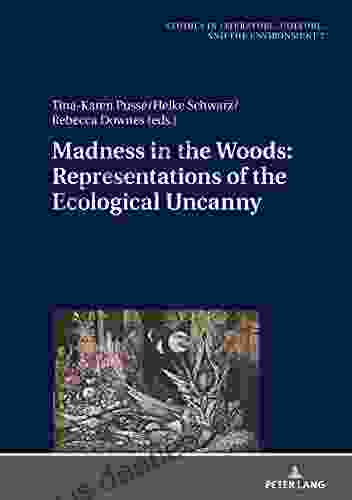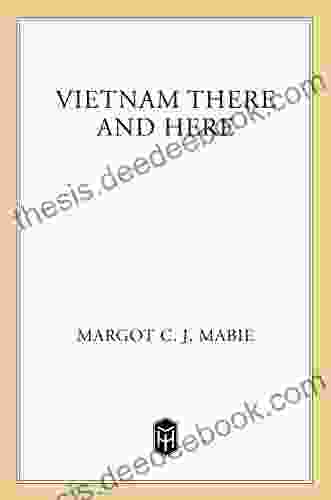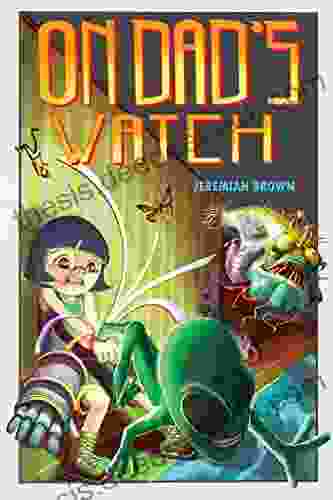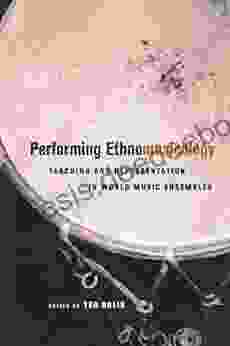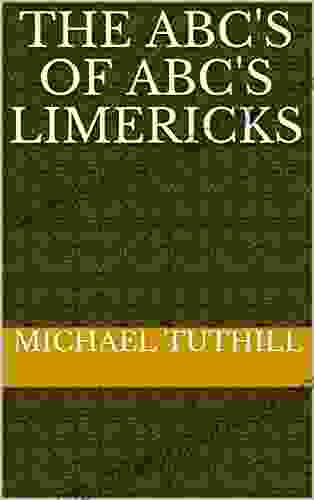Representations of the Ecological Uncanny: Studies in Literature, Culture, and the Environment

5 out of 5
| Language | : | English |
| File size | : | 2151 KB |
| Text-to-Speech | : | Enabled |
| Screen Reader | : | Supported |
| Enhanced typesetting | : | Enabled |
| Word Wise | : | Enabled |
| Print length | : | 240 pages |
In her book Undomesticated Ground: Recasting Nature as Feminist Space, literary scholar Stacy Alaimo coined the term "ecological uncanny" to describe the feeling of estrangement and disorientation that can arise from our encounters with the natural world in an age of environmental crisis.
The ecological uncanny is a response to the sense that the natural world is no longer familiar or predictable, but has become strange, threatening, and even hostile. This sense of estrangement can be caused by a number of factors, including climate change, pollution, and the loss of biodiversity.
The ecological uncanny is a powerful concept that can help us to understand the complex and often contradictory ways in which we relate to the natural world. In this article, I will examine representations of the ecological uncanny in a range of literary and cultural texts, from the Gothic novel to contemporary science fiction. I will argue that these texts can help us to understand the challenges and opportunities that we face in the Anthropocene, a new geological epoch in which human activity is the dominant force shaping the planet.
The Gothic Novel and the Ecological Uncanny
The Gothic novel is a genre of literature that emerged in the late 18th century and is characterized by its focus on the supernatural, the macabre, and the grotesque. Gothic novels often explore the themes of death, decay, and madness, and they often feature settings that are wild, isolated, and dangerous.
The Gothic novel is a particularly fertile ground for representations of the ecological uncanny. The genre's focus on the supernatural and the grotesque can be seen as a response to the sense of estrangement and disorientation that can arise from our encounters with the natural world. In Gothic novels, the natural world is often represented as a place of danger and mystery, a place where the forces of chaos and destruction are always lurking.
One of the most famous examples of the ecological uncanny in Gothic literature is the novel Frankenstein by Mary Shelley. The novel tells the story of Victor Frankenstein, a scientist who creates a monster from the body parts of dead animals. The monster is a grotesque and terrifying figure, and he embodies the fears and anxieties that we have about the dangers of scientific progress and the hubris of humankind.
The novel Frankenstein is a powerful example of how the Gothic novel can be used to explore the ecological uncanny. The novel's setting in a wild and isolated landscape, its focus on the supernatural and the grotesque, and its exploration of the themes of death, decay, and madness all contribute to a sense of estrangement and disorientation that is characteristic of the ecological uncanny.
Science Fiction and the Ecological Uncanny
Science fiction is a genre of literature that explores the possible consequences of scientific and technological progress. Science fiction often imagines future worlds that are very different from our own, and it often explores the ethical and social implications of new technologies.
Science fiction is another genre of literature that is well-suited for exploring the ecological uncanny. Science fiction writers often imagine future worlds that are ravaged by environmental pollution, climate change, and other forms of ecological disaster. These worlds are often strange and unfamiliar, and they can evoke a sense of estrangement and disorientation that is characteristic of the ecological uncanny.
One of the most famous examples of the ecological uncanny in science fiction is the novel The Road by Cormac McCarthy. The novel tells the story of a father and son who are traveling through a post-apocalyptic world that has been ravaged by environmental disaster. The world of The Road is a harsh and unforgiving place, and it is filled with the dangers of starvation, disease, and violence.
The novel The Road is a powerful example of how science fiction can be used to explore the ecological uncanny. The novel's setting in a post-apocalyptic world, its focus on the harsh realities of survival, and its exploration of the themes of loss, grief, and hope all contribute to a sense of estrangement and disorientation that is characteristic of the ecological uncanny.
The ecological uncanny is a concept that can help us to understand the challenges and opportunities that we face in the Anthropocene. The ecological uncanny is a feeling of estrangement and disorientation that can arise from our encounters with the natural world in an age of environmental crisis.
Representations of the ecological uncanny in literature and culture can help us to understand the complex and often contradictory ways in which we relate to the natural world. These representations can also help us to imagine new ways of living in harmony with the planet.
5 out of 5
| Language | : | English |
| File size | : | 2151 KB |
| Text-to-Speech | : | Enabled |
| Screen Reader | : | Supported |
| Enhanced typesetting | : | Enabled |
| Word Wise | : | Enabled |
| Print length | : | 240 pages |
Do you want to contribute by writing guest posts on this blog?
Please contact us and send us a resume of previous articles that you have written.
 Book
Book Novel
Novel Page
Page Chapter
Chapter Text
Text Story
Story Paperback
Paperback E-book
E-book Shelf
Shelf Glossary
Glossary Bibliography
Bibliography Foreword
Foreword Preface
Preface Footnote
Footnote Manuscript
Manuscript Scroll
Scroll Codex
Codex Tome
Tome Classics
Classics Library card
Library card Narrative
Narrative Autobiography
Autobiography Encyclopedia
Encyclopedia Dictionary
Dictionary Thesaurus
Thesaurus Character
Character Resolution
Resolution Librarian
Librarian Catalog
Catalog Borrowing
Borrowing Stacks
Stacks Archives
Archives Scholarly
Scholarly Lending
Lending Academic
Academic Journals
Journals Rare Books
Rare Books Interlibrary
Interlibrary Thesis
Thesis Storytelling
Storytelling Jesse Buenoano
Jesse Buenoano James George Frazer
James George Frazer Mary Jo Pollman
Mary Jo Pollman A Bean
A Bean Justin Chin
Justin Chin Sarah Chaker
Sarah Chaker Ifaanu Ifaanu
Ifaanu Ifaanu Mehran Kamrava
Mehran Kamrava Richard Stephen Felger
Richard Stephen Felger Lauren Tarshis
Lauren Tarshis Chris Ward
Chris Ward Janice Inman
Janice Inman Messoud Efendiev
Messoud Efendiev Peter Gelling
Peter Gelling Audrey Muller
Audrey Muller A A Clifford
A A Clifford Charlie Elder
Charlie Elder A C Stranger
A C Stranger Giuseppe Garibaldi
Giuseppe Garibaldi Paisley Rekdal
Paisley Rekdal
Light bulbAdvertise smarter! Our strategic ad space ensures maximum exposure. Reserve your spot today!
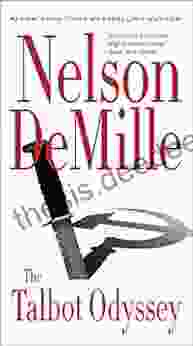
 Graham BlairThe Talbot Odyssey: Nelson DeMille's Enthralling Tale of Naval Intrigue and...
Graham BlairThe Talbot Odyssey: Nelson DeMille's Enthralling Tale of Naval Intrigue and... Ernest HemingwayFollow ·19k
Ernest HemingwayFollow ·19k Rubén DaríoFollow ·10.6k
Rubén DaríoFollow ·10.6k Wesley ReedFollow ·8.9k
Wesley ReedFollow ·8.9k Kazuo IshiguroFollow ·13.3k
Kazuo IshiguroFollow ·13.3k Dwight BlairFollow ·11.3k
Dwight BlairFollow ·11.3k Franklin BellFollow ·4.4k
Franklin BellFollow ·4.4k Cason CoxFollow ·9.7k
Cason CoxFollow ·9.7k Charles BukowskiFollow ·17.1k
Charles BukowskiFollow ·17.1k
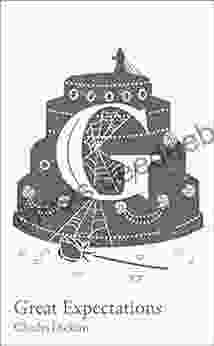
 Russell Mitchell
Russell MitchellGCSE Set Text Student Edition: Collins Classroom Classics...
The GCSE Set Text Student Edition: Collins...

 Ralph Turner
Ralph TurnerSix Sigma Lean Green Belt Training for Beginners with...
What is Six...

 Travis Foster
Travis Foster10 Life-Changing Lessons I Learned When I Was Single
Being single can...
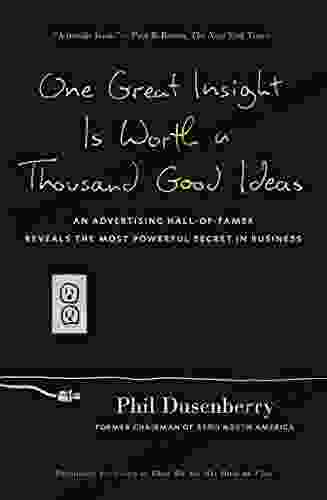
 Jermaine Powell
Jermaine PowellOne Great Insight Is Worth a Thousand Good Ideas
In the competitive and...
5 out of 5
| Language | : | English |
| File size | : | 2151 KB |
| Text-to-Speech | : | Enabled |
| Screen Reader | : | Supported |
| Enhanced typesetting | : | Enabled |
| Word Wise | : | Enabled |
| Print length | : | 240 pages |


